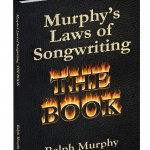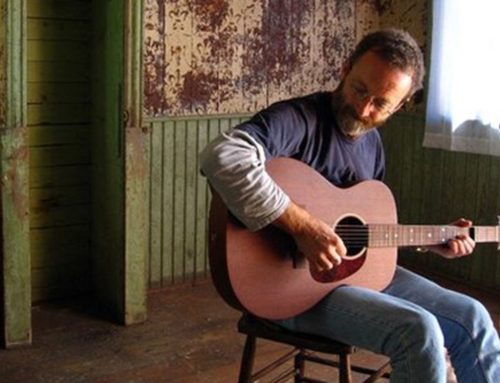The Song As A Script
by Ralph Murphy

The Song As A Script
Your song is finished.
You were eloquent.
The melody flowed.
You are fulfilled, complete.
You resound with satisfaction.
You said everything you wanted to say.
How could anyone fail to rush to record your song?
Well, not so fast… Your songs may be your little lambs, but when it comes time to send one of them to the market, keep in mind that some people hate lamb chops and others are allergic to wool.
So before you proceed, think back…
back to before you entered the music business;
back to when you were the audience and went to see singers for fun;
back to when you thought those singers were singing songs they had written about their own lives;
back to when you thought you were catching a glimpse of their inner souls. You were unaware that those inner souls had been crafted for them by Bacharach & David or Holland-Dozier-Holland.
Well, just as your favorite TV and movie stars do not write their own scripts, luckily for songwriters, neither do a lot of singers write their own songs.
The major difference between actors and singers however is that most actors can change characters from film to film whereas successful singers rarely depart radically from the image they have chosen.
That presents the songwriter hurdles that require investigation before rushing into pitch mode.
Not only must the song/script be in keeping with the artist’s image but a few music business executives must be persuaded to gamble a million dollars on it. Figuring in the cost of the sessions, (studio, production, musicians, etc) the video, tour support, radio school, stylists and of course radio, you are at a million big ones.
Your script has to function on a lot more levels than just entertaining your friends and family.
It is a script for a performer to stand on stage and have a linear, lyrical conversation with his or her audience (in my case is that audience is women!).
In my opinion, if you are a stand-alone writer – not a performer, not in a band – and you are not writing for women, you are decreasing your chances for success! Our world of entertainment is always ultimately about “The Woman.” With rare exceptions, it is men singing to women and women singing to women. So, the mantra for the songwriter parallels that of the restaurateur. When looking for a restaurant to invest in, there are three factors to consider: location, location, location. Likewise, to be a songwriter, there are three things you should consider: What’s in it for the woman? What’s in it for the woman? What’s in it for the woman?
So, when you see the word LISTENER in any of my articles, mentally substitute the word WOMAN.
So let’s focus on their perception of your song.
Aside from the work being right for the artist, is it a potential hit?
Do you get the listener involved in the song quickly? How quickly? Well, try 60 seconds, including introduction. I call it getting the listener to invest in your song. If I am drawn into a writer’s invention, it requires me to identify with (or ideally become) the hero, victim, winner or loser in the piece.
In order to lure me/the listener in, it’s better that you speak to me, not about me. Though I dealt with the pronoun (the little big word) in a previous column, let me remind you that when it comes to the song as a script, it is the little huge word. You’ll get my attention faster if the song is about You, I, Us or We, because if it’s about Her, Him or Them, it will be much harder to capture and keep my interest. However, if the song is using the first-person pronoun (you, me, I, etc.) and the central figure is too old, too young, not cool enough or just not the image that the artist, management or label wish to project, you might consider changing to the third-person pronoun (even though the odds are higher for your song not being #1). That way, the artist can sing the song (about being homeless a drunk perhaps) without it reflecting personally on him or her.
Next, you must create an expectation and then fulfill that expectation. Pull out some of your favorite songs and look at the titles – pretty average stuff, mostly words or phrases you use every day. However, those titles are the fulfillment of the created expectation. The genius is in the creation of the expectation. Making something commonplace eye-catching – or in the case of the song, ear catching – is your job.
I don’t know how many of you have seen an uncut diamond, but they look remarkably unremarkable, rather boring in fact. Only in the hands of someone who has absorbed the craft and mastered the skill of making the mundane sparkle does the seemingly dull come to life.
So, surprise me with interesting information, by asking a question with a different twist or by describing a condition, place, person or circumstance using words and phrases that make the ordinary extraordinary.
Well, I guess we need to have a checklist for this song that you have chosen to be a script for a specific artist.
High on that list is accessibility. How easy is the song to sing? Are you trying to fit three-syllable words into a one-syllable spot?
Singer/songwriters do it all the time and get away with it because they are the artists. You cannot.
Does its range span three notes or three octaves? Remember that a lot of “artisteests” may have an abundance of charisma, personality and sex appeal but honestly can’t sing very well. Send them the story songs because the more detailed the story, the less melody you need. Remember, the human animal is not very good at hearing more than one moving part at a time and given its preference will always defer to melody.
Now, if you’re pitching to divas or vocally well-endowed males, then be big on melody, heavy on monosyllabic words and open vowel sounds (A-E-I-O-U-Y!) and minimum story.
What is the song about? Will this artist’s audience identify him or her with this situation or circumstance? Does the artist use this language? Remember all that changes from genre to genre, aside from attitude, is vocabulary and technology. Vocabulary especially is a bond between the artist and the audience. That, by the way, is a huge obstacle for writers crossing to cultures and genres that they are not intimately connected to or understand personally.
And finally, have you told the whole story – beginning, middle and end? Have you created an expectation from the opening line, fulfilled that expectation in 60 seconds, added information/detail in the next verse, and spiced it up by adding conflict or calming it down? Have you made the listener laugh, cry, question, cheer, feel any (or all) of a whole range of emotions or just plain old fall in love?
Yes?
Then take it to the artist – job well done!
Ralph Murphy, hit songwriter and expert, has been successful for five decades. He wrote huge hit songs such as Crystal Gayle’s “Talking in Your Sleep” and “Half the Way”. Consistently charting songs in an ever-changing musical environment makes him a member of that very small group of professionals who make a living ding what they love to do. Add to that the platinum records as a producer, his success as the publisher and co-owner of the extremely successful Picalic Group of Companies and you see a pattern of achievement based on more than luck. Achieving “hit writer” status has always been a formidable goal for any songwriter. Never more so however than in the 21st century. Catching the ear of the monumentally distracted, fragmented listener has never been more difficult. Getting their attention, inviting them in to your song and keeping them there for long enough for your song to become “their song” requires more than being just a “good” songwriter.

Murphy’s Law of Songwriting
*His new book Murphy’s Laws of Songwriting “The Book” arms the songwriter for success by demystifying the process and opening the door to serious professional songwriting. Hall of fame songwriter Paul Williams said in his review of the book “If there was a hit songwriters secret handshake “Da Murphy” would probably have included it.” To get the book, enter 3 or more songs at the IAMA and receive this exclusive book for FREE»




